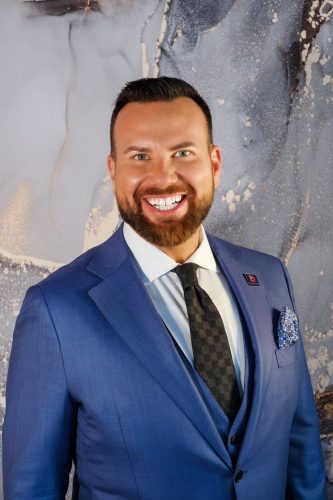Justin W. Ball, CMP has years of hands-on experience in the event industry. He’s president and founder of an experiential event marketing company called Bespoke and currently serves on the board for the Live Events Coalition. As an event planner himself, Justin has spent lots of time not just planning events, but taking them in as part of the audience. He recalls countless speakers who have completely mastered their craft with unmatched expertise in their respective fields.

When we last spoke to Justin he said he believed the future of the event industry is “bright.” Having a hopeful outlook about the future is a good thing, but this statement goes deeper than that. The future is bright, he says, because our industry has shown a knack for innovating, reinventing itself, and catering to the changing preferences of our audiences, as the past three years have made abundantly clear.
But our current trajectory shouldn’t be taken for granted. To continue on the promising path we’ve been on, event professionals have to avoid complacency at all costs and keep our eyes on what’s next. As we all look ahead to next year and beyond, Justin shared with me some important changes you should keep on your radar.
AAE: Thank you so much, Justin, for taking the time to chat with me about what we should be looking towards in 2024. Can you start with the topic of event format? What do you think we’ll see as we move into the new year?
JB: When considering the format of our events in the coming year, our approach should be to closely align our sessions with the way today’s attendees want to learn in 2024. It sounds so simple, but it’s something that isn’t always prioritized. Think about today’s classrooms. Once upon a time, you’d see rows of desks side by side with everyone directly facing the teacher, completely optimized for one way communication. Today, things look different.
No classrooms today look like rows of chairs — no one learns like that. What you see today, and really for some time, is desks broken up into smaller groups facing each other, allowing students to collaborate and have conversations.
Educators adapted their classroom setups to encourage discussion, collaboration, and peer interaction years ago. We’ve seen strides in the event industry too, but to meet the evolving expectations of our audiences in 2024, event organizers have to innovate if they want to set themselves apart.
We have to engage our speakers to think the same way that kids learn. Moving away from just one person speaking and everyone else listening. We’ve got to make space for collaboration to allow for those human intelligence moments.
AAE: Finding the right setup for every audience with education in mind is a great point. This brings to mind the impact of technology on how we shape event programs. Any insight on this?
JB: Innovation goes beyond the physical setup of an event space. Another key aspect of event planning in 2024 will be embracing the fact that we’re living in an increasingly digital world. In this “multiscreen life,” where audiences are accustomed to their phones being the primary way of interacting with people, brands, and content, it doesn’t make sense to ask attendees to put away these devices during event sessions.
We can’t both engage with brands and put away our phones. We have to be able to engage with that content — polling, mobile apps, Q&A during the actual talk. All of this builds momentum and keeps attendees engaged.
Collaborative event spaces and phone friendly environments aren’t new concepts — event industry leaders have spoken and written about these for years. And promisingly, many of us have experienced them for ourselves and seen firsthand how they can amplify the experience of attendees. Audiences are expecting more out of their event experiences, and we’ve got to deliver for them in 2024.
AAE: We love talking about event experiences over here. And, I could not agree more. We’ve got to continue to improve. In that realm, what other trends are you seeing in event programming currently?
JB: In my view, the speakers who make the greatest impact are those who can help audiences understand how it applies to them.
We have to move beyond the content and move into the ‘human intelligence’ of context. Event professionals and attendees are looking not just for content but also why it matters. Answer the question: Why should audiences care about this?
I recently heard a world-renowned chef as the keynote speaker for an event. Insights around what it takes to be a great cook and how to make it in fine dining are interesting, but the real value comes when that chef can break down how to utilize hospitality to make customers feel a certain way about your brand.
When that chef can share about how to create an experience that makes people feel comfortable spending hundreds of dollars on a meal, then those are rules of hospitality that I can take and apply to my business. It’s even more of a bonus when this speaker then takes a step back and allows the audience to discuss these potential applications, becoming more of a facilitator than a lecturer.
AAE: Justin, any final thoughts or ideas for what we’ll see in 2024? One topic we’ve seen event planners prioritizing in the past couple of years in particular is workplace culture. With large portions of the global workforce still fully remote or on a hybrid working schedule, it’s not hard to see why.
JB: Oh, absolutely. Organizations continue to look for ways to create connections between employees in a world where employees may go days without being in the same physical location as their coworkers. That’s why I expect that HR departments will be the driver for corporate events in 2024.
It’s about the human connection — which is why HR will drive smaller meetings that are about core values and shared experiences for employees. I think we’ll see more incentive-based or destination events as well.
This is where speakers and event planners will need to tie all of these components together — collaborative event formats, incorporating digital tools, and dynamic speakers who can do more than educate on a given topic.
We’ll have to find a way to connect people back to the culture. We have to force ourselves to find those moments that lead to meaningful connections.
AAE: Thank you so much, Justin, both for this valuable insight and for your continued collaboration to help our event organizers see the vast potential our industry has.
As we go through this process of being deliberate and predicting how to make the most of events in the year ahead, the important thing is that we’re focused on what’s next for our industry and ready to adapt to whatever comes our way. When we see this optimism from our clients, from Justin, and other friends in the event industry, we have to agree that the future looks bright.
Justin W. Ball, CMP is president and founder of Bespoke, an experiential event marketing company that brings their clients’ brand stories to life through personal and group engagement that connect and inspire – from meetings, conferences, trade shows, incentive trips, video, podcasts, and social media, and more. Justin has years of experience in the event industry and currently serves on the board for the Live Events Coalition.



